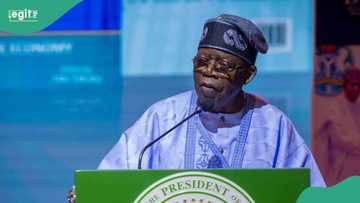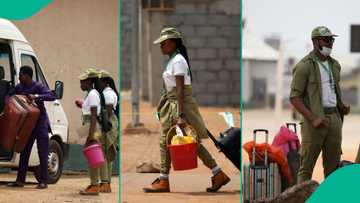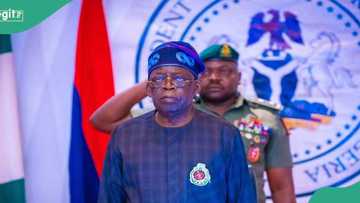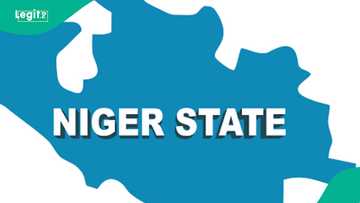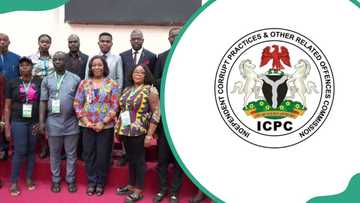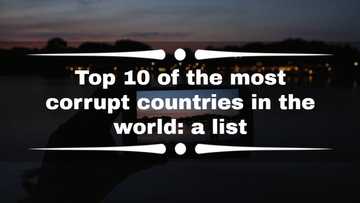List of paramilitary forces in Nigeria: what do they do?
A paramilitary force is a group of civilians organized militarily mainly to operate in place of or assist regular army troops. Unlike military forces that protect the country from external threats, paramilitary forces protect the country’s citizens from internal violence. According to Miriam Adah, Doctoral Researcher in Defence and Strategic Studies at the Nigerian Defence Academy Kaduna, these forces play a crucial role in border control, crisis response, and maintaining law and order. Here is a list of paramilitary forces in Nigeria and their duties.
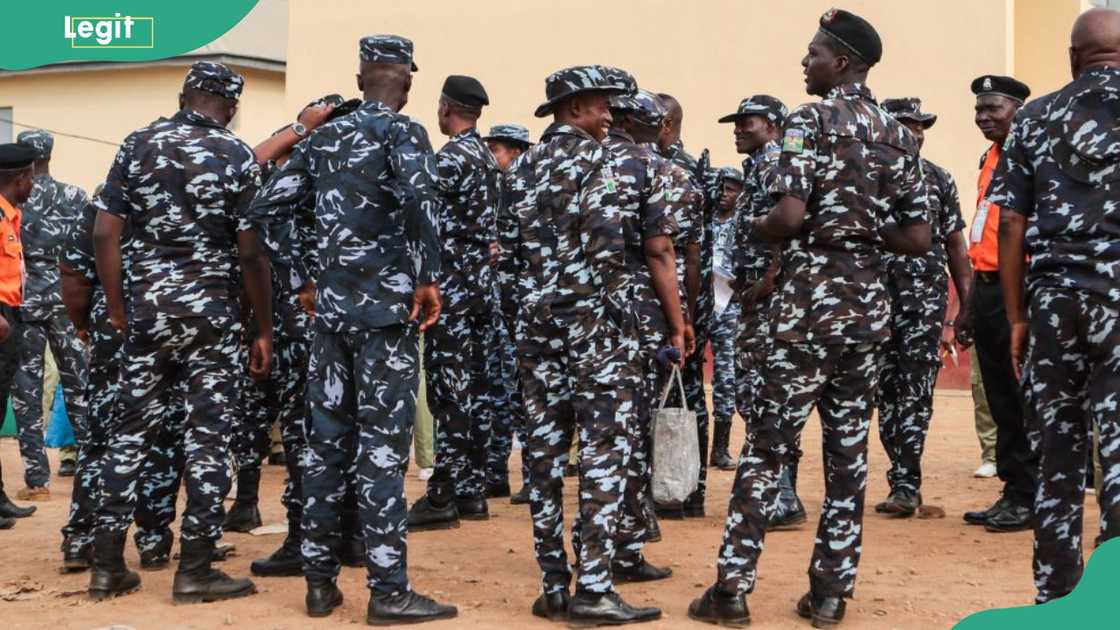
Source: Getty Images
TABLE OF CONTENTS
- Key takeaways
- List of paramilitary forces in Nigeria
- 1. The Nigerian Police Force (NPF)
- 2. The Nigerian Security and Civil Defence Corps (NSCDC)
- 3. The Nigerian Immigration Service (NIS)
- 4. The Nigerian Customs Service (NCS)
- 5. The Nigerian Correctional Service (NCOS)
- 6. The National Drug Law Enforcement Agency (NDLEA)
- 7. The Federal Fire Service (FFS)
- 8. The Federal Road Safety Corps (FRSC)
- 9. The Economic and Financial Crimes Commission (EFCC)
- How do paramilitary forces differ from the military?
- Key challenges faced by paramilitary forces in Nigeria
- Nigeria’s paramilitary structure compared to other countries
- Is Man O' War a paramilitary in Nigeria?
- Is the police a paramilitary in Nigeria?
- Which is the highest-paid paramilitary in Nigeria?
Key takeaways
- Paramilitary forces collectively play a vital role in securing Nigeria’s internal stability and public safety.
- Key challenges faced by paramilitary forces include funding shortages, inadequate personnel welfare, lack of modern equipment, and overlapping mandates.
- Some paramilitary services in Nigeria include the Nigeria Customs Service (NCS), Nigeria Immigration Service (NIS), Nigeria Correctional Service, Federal Fire Service (FFS), Nigeria Security and Civil Defence Corps (NSCDC), Federal Road Safety Corps (FRSC), and National Drug Law Enforcement Agency (NDLEA).
The high rate of insecurity in Nigeria has created the need for several paramilitary organizations. These organizations help maintain law and order, ensure the safety and peace of its citizens, protect the country's borders, and support the Nigerian military internally.
List of paramilitary forces in Nigeria
What does the paramilitary do? They support law enforcement and military operations. They often focus on internal security, law enforcement, and maintaining public order. Below is the complete list of the main paramilitary forces in Nigeria and their functions.
1. The Nigerian Police Force (NPF)
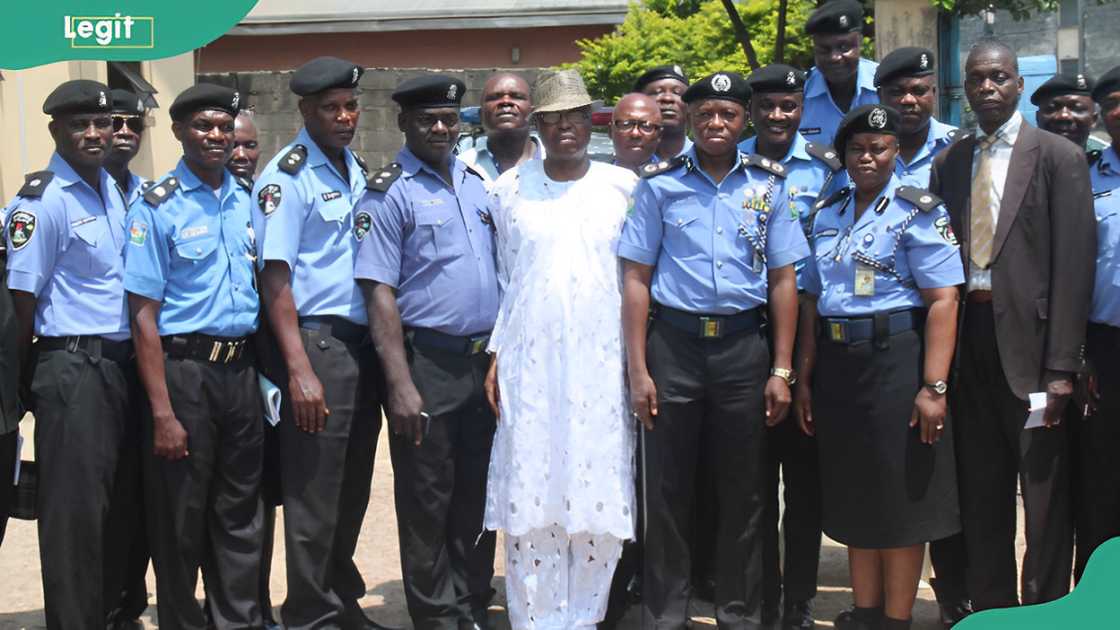
Source: Facebook
The Nigerian Police Force (NPF) is Nigeria's primary security and law enforcement agency. It is a vast organization meant to protect citizens and their interests. Some of the main functions include:
- Crime prevention — They ensure they have reduced crime, enforced the law, and maintained criminal justice.
- Protection of lives — Police officers have to guide their districts and do everything to prevent crimes that can potentially cause human death.
- Property protection—One of the top functions of the police in modern society is protecting all types of property from thieves and bad people.
- Order preservation — Nigerian officers must preserve order in the district for which they are responsible.
- Offenders are arrested — Police officers arrest offenders, thieves, and anyone who commits illegal acts in public or privately.
- Crime detection — It is an essential duty and task of every officer in every state nationwide. Each crime must be investigated, and related offenders must be arrested and sent to jail.
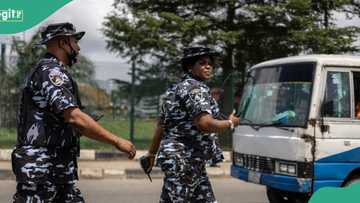
Read also
"Avoid embarrassment": Police begin 3rd-party vehicle insurance enforcement, set fine for offenders
2. The Nigerian Security and Civil Defence Corps (NSCDC)
The Nigerian Security and Civil Defence Corps (NSCDC) is a formation of the Nigerian National Assembly. The paramilitary institution was established in May 1967 during the Nigerian civil war. Below are some of their primary roles.
- Maintaining peace, order, and protection of the civil populace during times of emergency.
- Assisting in providing emergency medical services, including first aid, during any period of emergency.
- Giving recommendations to the minister regarding the registration of private security companies.
- Inspecting the facilities of private security companies and approving or disproving them if they are not up to standard.
- The agency assists in decontaminating and taking precautionary measures during an emergency.
- It plays a significant role in monitoring and supervising the activities carried out by private security companies.
- Looking into activities that might result in defrauding local, state, or federal governments.
- Assisting in the distribution of emergency supplies.
- Providing assistance to restore and maintain order in distressed areas in any period of emergency.
3. The Nigerian Immigration Service (NIS)
The Nigerian Immigration Service (NIS) is a paramilitary organization established to provide adequate border security and migration management. Here are their roles.
- To control persons entering or leaving Nigeria.
- The issuance of travel documents, including Nigerian passports.
- To bonafide Nigerians within and outside Nigeria.
- The issuance of residence permits to foreigners in Nigeria.
4. The Nigerian Customs Service (NCS)
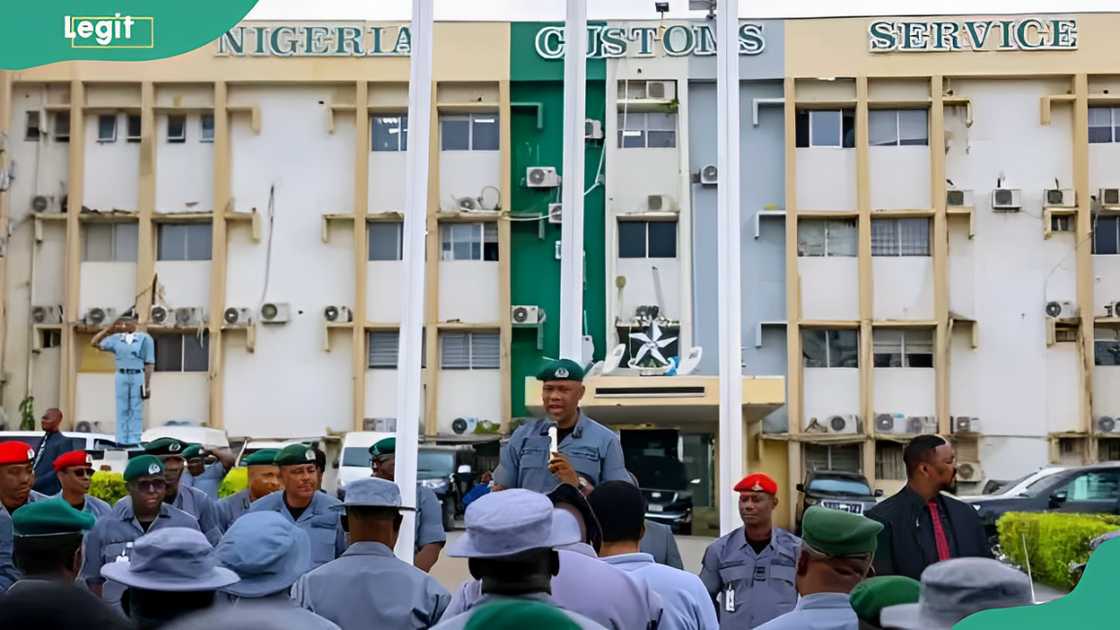
Source: Instagram
The Nigerian Customs Service (NCS) is a paramilitary organization under the supervision of the Nigerian Ministry of Finance. It is concerned with the well-being of its employees throughout all regions of Nigeria. Here are some of the NCS functions.
- Intercept contraband such as illegal drugs and weapons.
- Check travelers and their baggage, cargo, and mail; assess and collect customs duties and other taxes on goods and services.
- Protect businesses against illegal trade malpractices.
- Enforce import and export restrictions and prohibitions.
- Collect accurate import and export data for economic statistical usage and planning.
- Use intelligence and risk assessment to target our physical checks on containers, vessels, or travelers.
5. The Nigerian Correctional Service (NCOS)
The Nigerian Correctional Service (NCOS), formerly known as the Nigerian Prison Service (NPS), is a government agency in Nigeria that operates prisons. It is the mandate to ensure the safety and orderly functioning of the jails and comply with international human rights standards. Here are some of its primary functions.
- Taking custody of all persons legally interned.
- Providing safe, secure, and humane custody for inmates.
- Conveying remand persons to and from courts in motorized formations.
- Identifying the existence and causes of anti-social behaviors of inmates.
- Conducting risk and needs assessment to develop appropriate correctional treatment methods for reformation, rehabilitation, and reintegration.
- Initiating behavior modification in inmates through the provision of medical, psychological, spiritual, and counseling services for all offenders, including violent extremists.
- Empowering inmates by deploying educational and vocational skills training programs and facilitating incentives and income generation through Custodial Centres, farms, and industries.
- Administering Borstal and related institutions.
6. The National Drug Law Enforcement Agency (NDLEA)
The National Drug Law Enforcement Agency (NDLEA) is a paramilitary agency in Nigeria that is in charge of drug policy and control. They often target airports and other points where people may cross the border. Their roles include:
- Eradication of illegal drug trafficking and usage.
- Suppression of demand for such goods.
- Recovering all the country losses which occurred as a result of illicit drug production and trafficking processes.
- Avoid drug abuse and eliminate such a habit in the Nigerian environment.
- Rehabilitation of drug users.
7. The Federal Fire Service (FFS)
The Federal Fire Service (FFS) is the principal agency of the Federal Government of Nigeria, established by an Act of Parliament. Their functions include:
- Rescue fire prevention.
- Mitigation.
- Offering paramedical and information services.
- Fire fighting.
8. The Federal Road Safety Corps (FRSC)
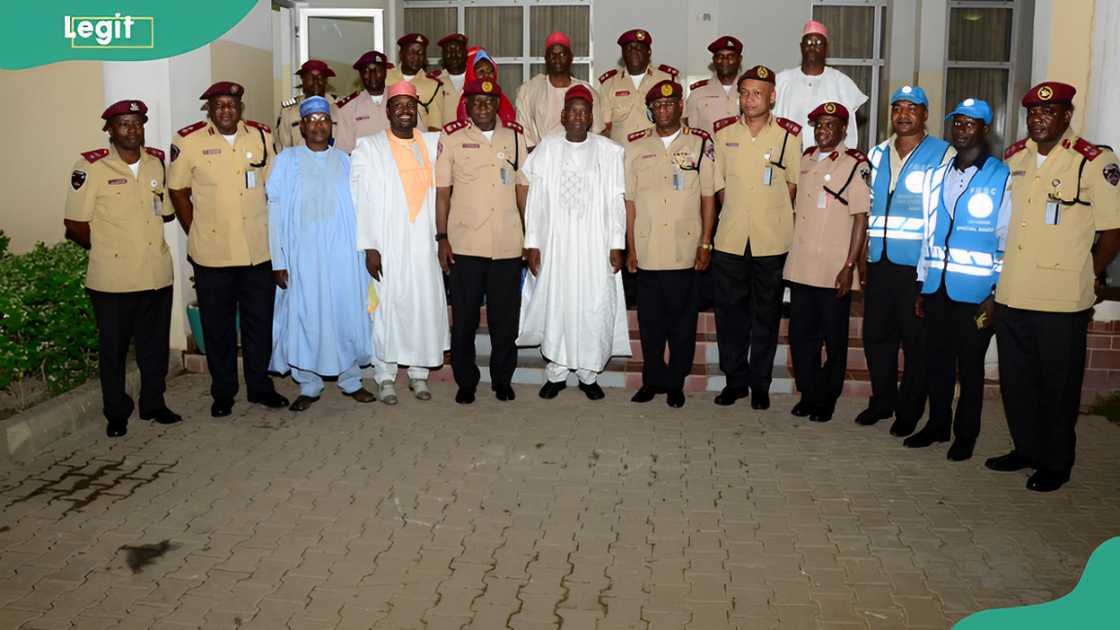
Source: Facebook
The Federal Road Safety Corps (FRSC) is a paramilitary organization mandated by law to check vehicles on Nigerian roads. It is empowered by law to carry out routine checks on all vehicles on major routes in Nigeria. Check out their functions below.
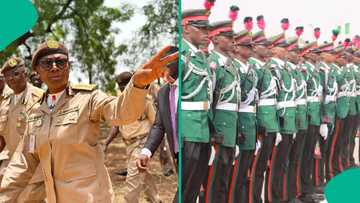
Read also
FG raises alarm over emergence of a new sect separating children, sends message to Nigerians
- Educating drivers, motorists, and other members of the public on the proper use of highways.
- Designing and producing the driver's license to be used by various categories of vehicle operators.
- From time to time, determining the requirements to be satisfied by an applicant for a driver's license.
- Designing and producing vehicle number plates.
- Determining and enforcing speed limits for all categories of roads and vehicles and controlling the use of speed-limiting devices.
- Cooperating with bodies, agencies, or groups in road safety activities or the prevention of accidents on the highways.
- Making regulations in pursuance of any of the functions assigned to the corps by or under this act.
- Regulating the use of sirens, flashers, and beacon lights on vehicles other than ambulances and vehicles belonging to the Armed Forces, Nigeria Police, Fire Service, and other Paramilitary agencies.
9. The Economic and Financial Crimes Commission (EFCC)
The Economic and Financial Crimes Commission is a paramilitary in Nigeria charged with enforcing all economic and financial crimes laws in the country. Here are some of the EFCC roles.

Read also
“Ritual killings, human part business has taken over Igala Land,” Kogi PDP chieftain Okai cries out
- The adoption of measures to eradicate the commission of economic and financial crimes.
- Adopting coordinated, preventive, and regulatory measures, introducing and maintaining investigative and control techniques to prevent economic and financial-related crimes.
- Facilitating the rapid exchange of scientific and technical information and the conduct of joint operations geared towards eradicating economic and financial crimes.
- The examination and investigation of all reported cases of economic and financial crimes to identify individuals' corporate bodies or groups involved.
- Determining the extent of financial loss and such other losses by government, private individuals, or organizations.
- Collaborating with government bodies within and outside Nigeria, carrying out functions wholly or partly analogous to those of the commission concern.
How do paramilitary forces differ from the military?
Miriam Adah, Doctoral Researcher in Defence and Strategic Studies at the Nigerian Defence Academy Kaduna, explained in an interview that paramilitary forces in Nigeria are structured similarly to the military but have a more civilian-oriented mandate. Miriam said:
The military forces are tasked with suppressing insurrection and maintaining the country’s territorial integrity, while the paramilitary forces may provide some support in other aspects of such operations.
For instance, military exercises in different theatres always comprise several components outside of the regular military, and these components are put together based on the peculiarities of conflict.Theatres in the Northeast and Northwest would also include the Nigeria Customs and Nigeria Immigration components to oversee aspects that pertain to the core mandate of their services.
This is to say that while the paramilitary is organized like the military, their mandate and functions pertain to less militarized aspects of security than what the regular military is concerned with.
Key challenges faced by paramilitary forces in Nigeria
Miriam said that despite the crucial roles of paramilitary agencies in Nigeria, they face several challenges, including:
- Funding shortages
Funding is a challenge that permeates almost every sector in the country, and despite that security is allocated a huge chunk of the budget, the allocation assigned to the paramilitary services is less than that of the armed forces.
Personnel welfare and security could be lumped underfunding. Staff of these agencies should feel a sense of security and satisfaction from their jobs, and if their welfare is not adequately catered for, it could impinge on their ability to deliver on their jobs.
- Outdated equipment and up-to-date technology
Security is evolving, and security threats have continued to move from the typical risks that they used to be. As such, it is pertinent to acquire equipment and train personnel to be suited to tackle these challenges.
- Overlapping mandates
Some of the mandates of these services are similar, and as such, in the administering of their roles, they may end up providing the services that other agencies are mandated to.
Such instances could lead to rivalry and competition instead of collaboration among the agencies. Dire consequences like hoarding intelligence and other important information that may come at a cost to the country could result from such competition.
Nigeria’s paramilitary structure compared to other countries
Miriam explains how Nigeria’s paramilitary structure compares to other countries with similar needs:
India, which has a large population that is multi-ethnic and has encountered insurgency, has ten paramilitary forces, each assigned functions that are peculiar to the country’s security needs. Ethiopia had at least 10 regional security bodies until two years ago when the federal government committed to absorbing these bodies into the federal or regional police or the national defense force.
Like Nigeria and India, Ethiopia is a multiethnic state and has had multiple security challenges, some of which it still faces to date. Nigeria’s paramilitary structure shares more similarities with India, in the sense that the agencies in Nigeria are tasked with different mandates, each addressing a different problem.
Interestingly, not all of Nigeria’s paramilitary services are permitted to carry weapons. The FRSC and FFS are unarmed units and all the agencies and units are centralized unlike in Ethiopia where the regional security bodies drew their authority from the regional governments and not the federal.
Is Man O' War a paramilitary in Nigeria?
Yes. It is a voluntary paramilitary organization founded in 1951 in Nigeria. The News Agency of Nigeria (NAN) reported that it was established by the Federal Government through the Citizenship and Leadership Training Centre Act as empowered by its enabling ordinance. It is a viable and potent force in promoting the center's ideals and mobilizing youth at the grass-roots level.
Is the police a paramilitary in Nigeria?
The Nigerian Mobile Police (MOPOL) force is the paramilitary arm of the Nigeria Police Force. It operates under orders from the Nigerian Federal government.
Which is the highest-paid paramilitary in Nigeria?
According to Nigerian Waves, the Nigerian Police Force is the highest-paid paramilitary in Nigeria. Salaries range from N108,233 to N8,537,976 annually, or approximately N9,019.42 to N711,498 monthly.
Paramilitary organizations in Nigeria play a significant role in maintaining security and order within the country. The paramilitary forces in Nigeria comprise nine significant agencies that perform different roles, such as enforcing migration laws, combating smuggling, providing emergency response services, and ensuring road safety.
Legit.ng recently published an article about the EFCC recruitment portal. The Economic and Financial Crimes Commission (EFCC) investigates fraud, corruption, and money laundering-related crimes. The chairman of the EFCC is Olanipekun Olukoyede.
The Economic and Financial Crimes Commission (EFCC) was founded in 2002. It advertises job positions and career opportunities from time to time through its recruitment portal. Learn whether they have a recruitment exercise in 2024 in the post.
Source: Legit.ng

Isaac Wangethi (Lifestyle writer) Isaac Wangethi has been a content writer at Legit since September 2021. He has gained valuable experience working on various projects, such as celebrity biographies, lifestyle, news and many more. Isaac won the Writer of the Year Award on Legit in 2023. He earned a Bsc. of Science in Information Technology in 2017 from the University of Nairobi and a Higher Diploma in Computer Software Engineering from Gretsa University in 2021. In 2023, Isaac finished the AFP course on Digital Investigation Techniques. In March 2024, he completed the Google News Initiative course. Email: Wangethin@gmail.com

Mary Ugbodaga (Lifestyle Journalist) Mary Ugbodaga is a Legit.ng journalist with 7 years of experience in journalism and media communications. She graduated from Covenant University in 2018 with a Bachelor's degree in Mass Communication/Media Studies. Mary previously worked as a journalist at TheCable, CNBC AFRICA, Voice of Nigeria, KPMG Nigeria. Email: mary.ugbodaga@corp.legit.ng.


